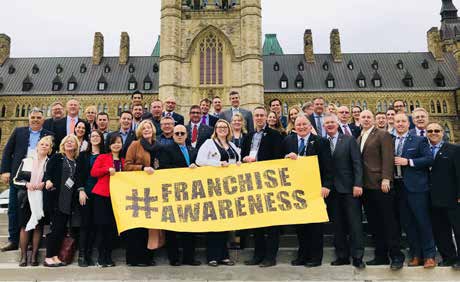With a mission to help everyday Canadians realize the dream of building their own business, the CFA made it a priority in 2018 to fight to protect the franchise business model through extensive advocacy efforts.
This mission continues in 2019 and we’re pleased to highlight our efforts in helping the franchise industry grow:
Supported the passing of the Making Ontario
Open for Business Act (Bill 47). As part of the
CFA’s commitment to creating an environment where
franchise businesses can thrive, we backed Bill 47,
which repealed a number of burdensome aspects of
Bill 148, the Fair Workplaces, Better Jobs Act.
Received an Ontario grant under the Employment Standards Training and Education Program (ESTEP). The CFA partnered with the Ontario Ministry of Labour to raise awareness of employer responsibilities under the Employment Standards Act (ESA).
Submitted comments on B.C. Employment Standards Review. When the British Columbia Law Institute (BCLI) released a 400-page report with nearly 80 tentative recommendations to government for amendment of their Employment Standards Act, the BCLI requested feedback from stakeholders. We submitted a written response which aligned with those previously submitted in Ontario and Alberta during their respective employment standards reviews.
Submitted comments on B.C. Labour Code.
We joined a network of B.C. businesses to produce joint-submissions for commenting on the province’s
mandate to update their labour and employment
laws. We helped identify areas that require
improvement due to the modern and ever-changing
workplace.
Released the first ever Economic Impact Report on Canadian franchising. We partnered with the Canadian Centre for Economic Analysis (CANCEA) to produce the CFA’s Economic Impact Report, which presented an overview of franchising’s contributions to the Canadian economy.
Consulted with Ontario Government on Retail Cannabis Distribution. Our ‘Frannabis’ Task Force advocated for the franchise industry to operate cannabis retail stores in Ontario following the federal government’s legalization of recreational cannabis.
Held Vital Meetings Coast to Coast. The CFA took to the East Coast to meet with Deputy Ministers of Business, Labour, Finance, Industry, and others in Newfoundland, P.E.I., and Nova Scotia. These proactive government meetings built on similar meetings held in Alberta, Ontario, New Brunswick, and Saskatchewan earlier in the year.
Raised #FranchiseAwareness on Parliament Hill and in Queen’s Park. We celebrated Franchise Awareness Day on Parliament Hill in Ottawa and at Queen’s Park in Toronto to connect face-to-face with politicians to talk about the importance of franchising.
Submitted comments on class actions. Following a Law Commission of Ontario (LCO) review of class actions in Ontario, the CFA submitted comments on the review, suggesting that Ontario’s class proceedings statute address national class actions in a way that fosters the continued growth of the franchise business model.
Here are CFA’s Advocacy Accomplishments:
Conservative Government Overturns Previous Liberal Government’s Labour Changes
After consultation and voicing the concerns of the franchise community and the broader business community, the CFA and its members are committed to creating an environment where business can thrive. Late 2018, the Ontario government passed the ‘Making Ontario Open for Business Act’, fulfilling one of Premier Doug Ford’s leading campaign promises to make Ontario “open for business” once again. The Making Ontario Open for Business Act enables Ontario employers to boost job creation and investment by cutting unnecessary regulations and repealing some of the most burdensome aspects of Bill 148. Amendments repealed include:
- Employment Standards Act, 2000 (ESA)
- Maintaining Ontario’s current minimum wage at $14 per hour until 2020, to be followed by increases tied to inflation
- Replacing the current Personal Emergency Leave rules with three days for personal illness, three days for family responsibilities, and two days for bereavement
- Repealing scheduling provisions to allow for more flexibility for employers and employees
- Repealing the averaging public holiday pay formula prescribed by Bill 148 and returning to the previous prorating formula
- Repealing equal pay for equal work on the basis of employment status and assignment employee status, but maintaining the requirement for equal pay on the basis of sex
- Repealing the requirement for the employer to prove that an individual is not an employee where there is a dispute over whether the individual is an employee
- Labour Relations Act, 1995 (LRA)
- Repealing rules that forced card-based certification on the workers in home care, building services, and temporary help agencies, and will return to vote through a secret ballot
- Repealing rules that force an employer to provide a union with employees’ personal information if 20% of workers showed interest in joining a union
- Reinstating pre-Bill 148 test and preconditions for the Ontario Labour Relations Board (OLRB) to certify a union as a remedy for employer misconduct
- Repealing the power of the OLRB to review and consolidate newly certified bargaining units with existing bargaining units
CFA Submits Comments on B.C. Employment Standards Review
In the summer of 2018, the British Columbia Law Institute (BCLI) released a 400-page report with nearly 80 tentative recommendations to government for amendment of their Employment Standards Act. BCLI requested feedback rom stakeholders and the public by August 2018.
The CFA submitted a written response which aligned with those previously submitted in Ontario and Alberta during their respective employment standards reviews. Thankfully, BCLI’s report had no recommendations suggesting a oint-employer designation.
After a full review and consideration of all submissions, BCLI will amend their recommendations accordingly and submit to government. The CFA will keep members updated as they progress on this file, and will continue to advocate for policies that allow the franchise industry to thrive.
CFA Submits Comments on B.C. Labour Code Review Panel
As part of the province’s mandate to update their labour and employment laws, the B.C. government appointed an independent review panel to review B.C.’s labour code and identify areas that require improvement due to the modern and ever-changing workplace.
The Panel held a first round of consultations in the Spring of 2018, and after consideration of input from those consultations, released a full report with 29 tentative recommendations to the public, requesting another round of consultation. The CFA joined a network of other B.C. businesses to produce joint-submissions for both rounds of
consultation and are confident the government is hearing the business industry’s perspective.
The CFA Awarded Ontario Grant to Produce Employment Standards Training and Education Program (ESTEP)
The CFA was one of four recipients to be awarded an Ontario grant under the ESTEP initiative to produce various materials designed to help franchise business employers better understand their obligations under the Employment Standards Act, 2000 (ESA).
The key objective of the ESTEP program is to expand the scope of the Ontario Ministry of Labour’s existing education and outreach efforts by funding external organizations to develop educational programs aimed at educating employers and employees within different industries.
The CFA officially launched their Employment Standards and Education Program for Ontario Franchised Businesses initiative shortly after our 2018 National Convention. Materials available to members and the broader public include a detailed and informative Tool Kit, articles in our Franchise Voice and Franchise Canada magazines, webinars and seminars presented by employment and labour lawyers, as well as other materials to help make Ontario’s labour laws more accessible and easier to navigate.
CFA Commissions First Ever Economic Impact Report on Canadian Franchise Industry
The CFA joined forces with an economic research firm to produce the first ever report of its kind in Canada. The CFA’s Economic Impact Report presents an overview of the state of the nation for franchising in Canada. Prepared for the CFA by the Canadian Centre for Economic Analysis (CANCEA), this report gives an in-depth look at what’s happening in Canadian franchising –from the economy to employment to growth both national and provincially.
The CFA had also commissioned Canada’s first ever Franchise Forecast report, detailing franchise growth across the country in 2018 by sector and province.
The report presents an outlook of franchising in the Canadian economy in 2018. For franchisors operating in Canada, the information is vital when planning expansion efforts and modeling system-wide performance.
CFA Consults with Ontario Government on Retail Cannabis Distribution
Late 2018, the CFA struck a ‘Frannabis’ Task Force in response to the legalization of cannabis in Canada, and the preliminary stages of allowing recreational retail cannabis stores in Ontario. The CFA felt it necessary to be ahead of the curve on advocating for the franchise business model’s place in the retail market.
In the wake of Bill 36, Cannabis Statute Law Amendment Act, 2018, the CFA submitted written comments to the
Standing Committee on Social Policy, emphasizing our support of the lack of restrictions within the statute, therefore allowing the franchise industry to operate recreational cannabis retail locations within the province of Ontario. The emerging Canadian recreational cannabis market provides an exciting opportunity for entrepreneurs, including franchisors and franchisees, to enter into a rapidly growing industry.
The Government of Ontario has decided that it would allow only 25 retail store authorizations before December 13, 2019 and that these 25 applicants would be selected by way of a random lottery. On January 11, 2019, the 25 lottery winners were selected. The CFA will keep members updated as this process continues.
CFA Consults on Class Action Review
Last year, the Law Commission of Ontario (LCO) took on the first independent, evidence-based, and comprehensive review of class actions in Ontario since the enactment of the Class Proceedings Act in 1993. During this period, class actions have grown dramatically in volume, complexity, and impact in Ontario and across Canada.
In March 2018, the LCO released a consultation paper asking for submissions from the public. The CFA participated in this consultation, ultimately submitting that Ontario’s class proceedings statute address national class actions in two distinct ways.
First, Ontario should adopt the approach of other provinces in setting out the standard for an Ontario court to assume jurisdiction over a national class action. Second, Ontario should also adopt the approach of other provinces in expressly permitting Ontario courts to decline to certify a class proceeding where one already exists in another province.

CFA Meets with Ministers and Politicians Throughout Canada
The CFA continued to advocate for the franchise business model with key meetings held between franchise industry leaders, politicians, and ministers throughout the country. First, the CFA took to the East Coast to meet with Deputy Ministers of Business, Labour, Finance, Industry, and others in Newfoundland, P.E.I., and Nova Scotia. These proactive government meetings built on similar meetings held in Alberta, Ontario, New Brunswick, and
Saskatchewan earlier in the year. On April 24 2018, the CFA brought their advocacy efforts to Parliament Hill for FranchiseAwareness Day.
Organized by the CFA, Franchise Awareness Day was designed to educate government about the importance of the franchise business model in Canada by connecting Members of Parliament (MPs) from across Canada with more than 75 senior franchise business leaders. From Caucus meetings to one-on-one meetings to our cocktail reception, it was a day marked by connection, education, and empowerment. Together, participating franchise members were able to express the ongoing role franchising has played in their lives and their communities.

